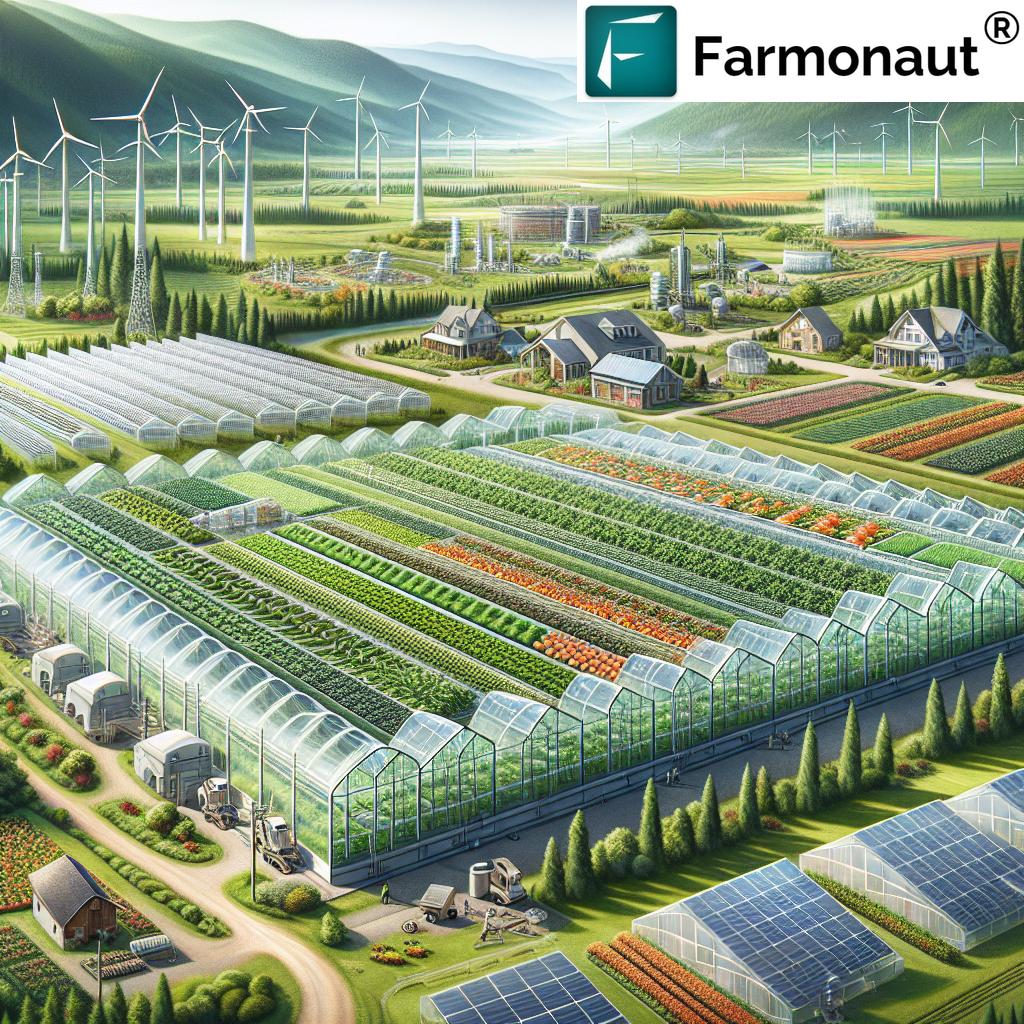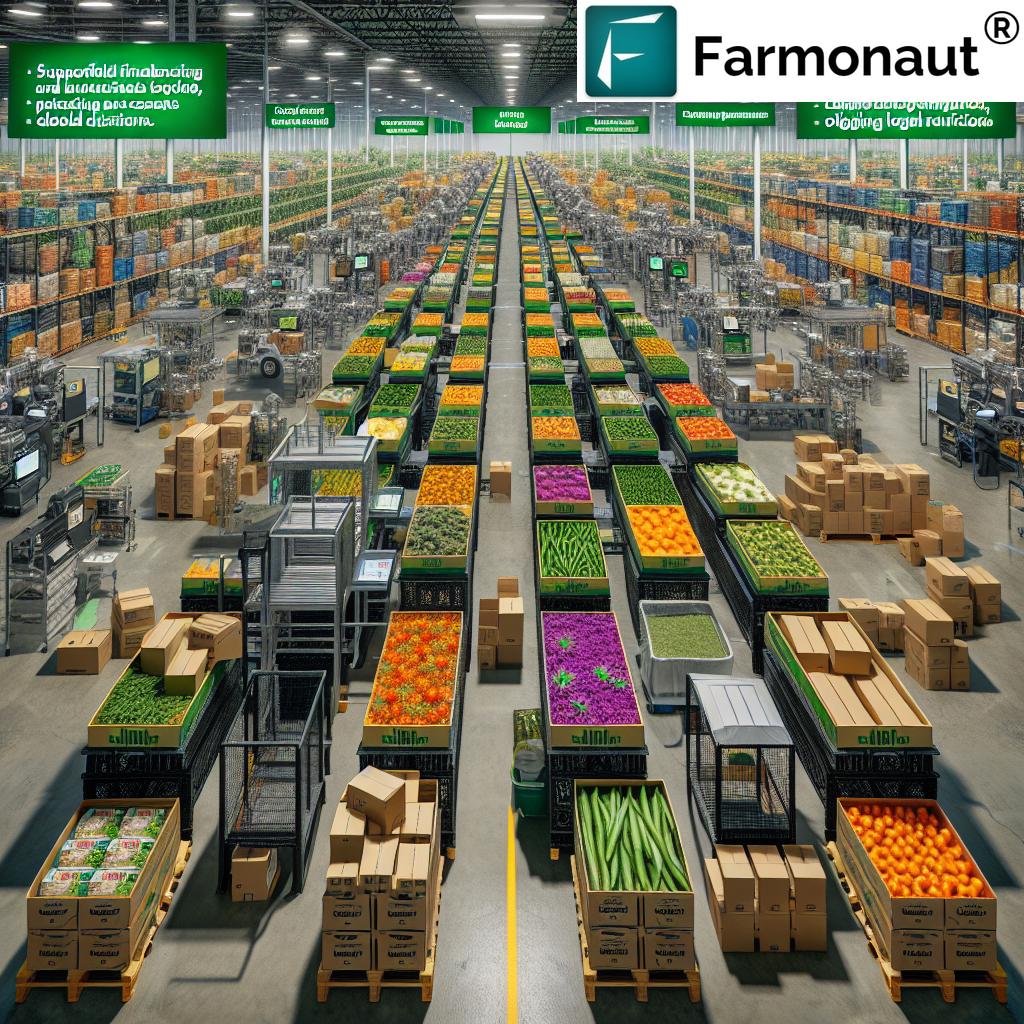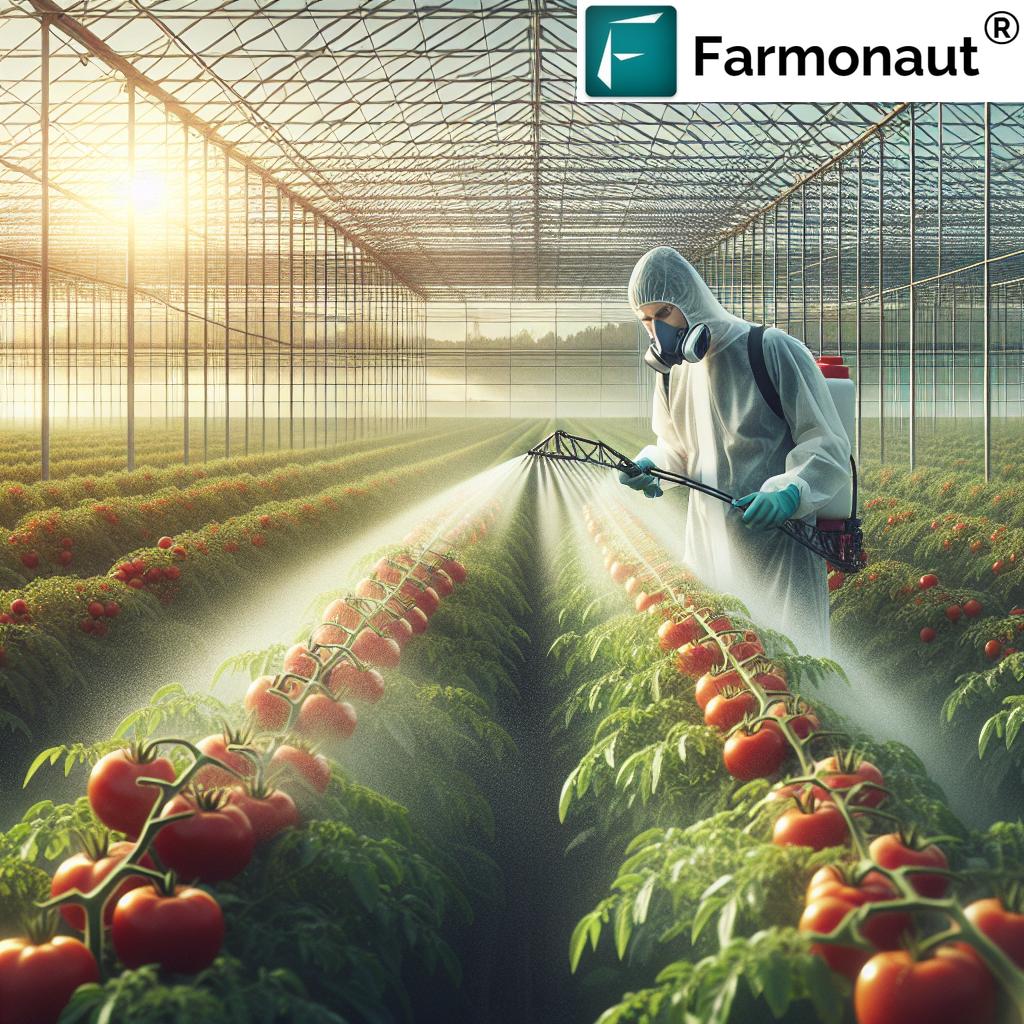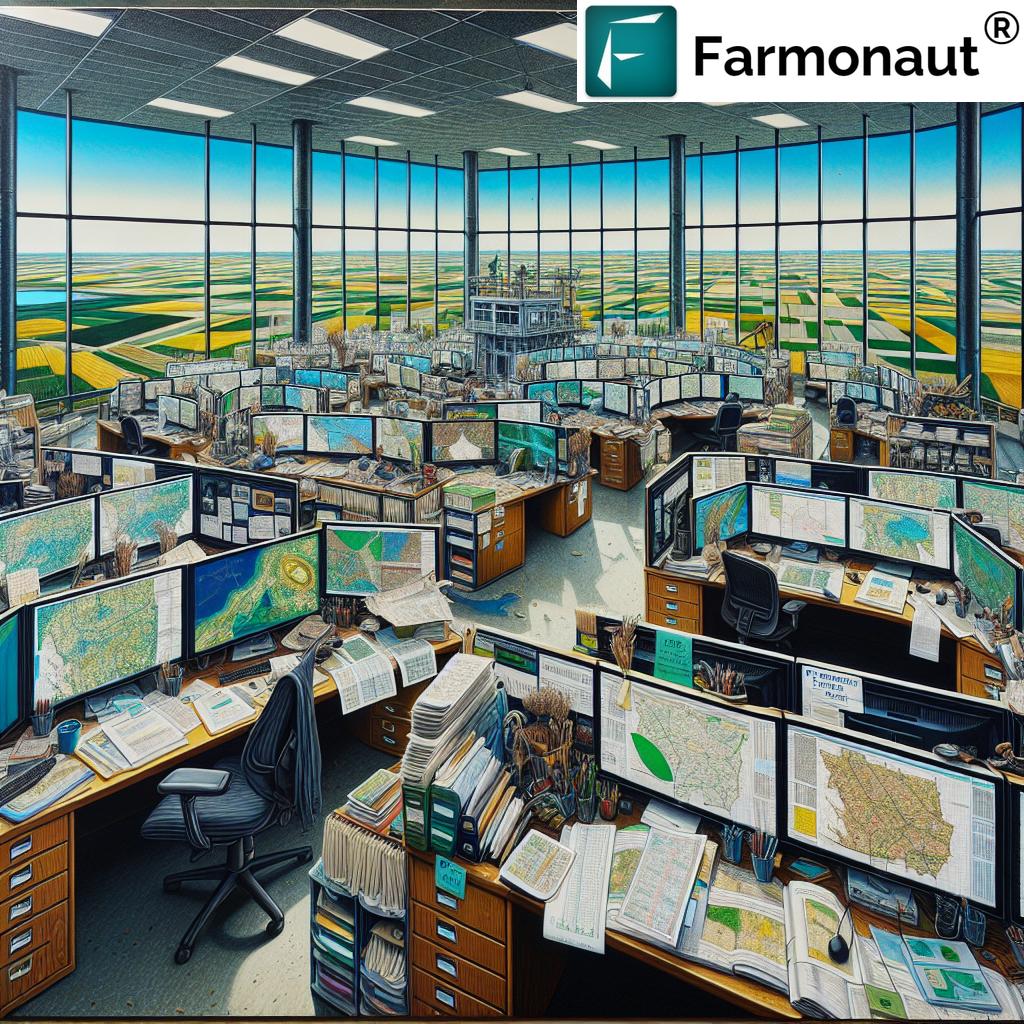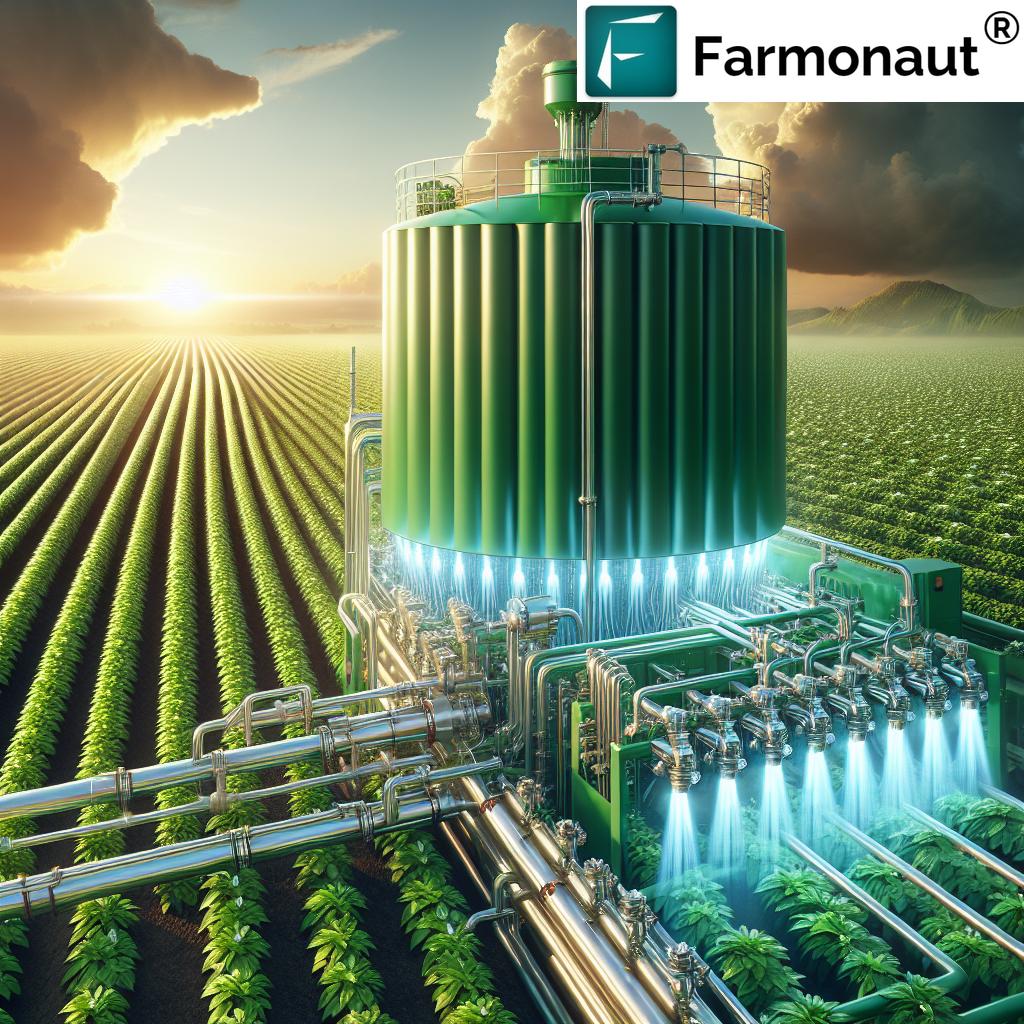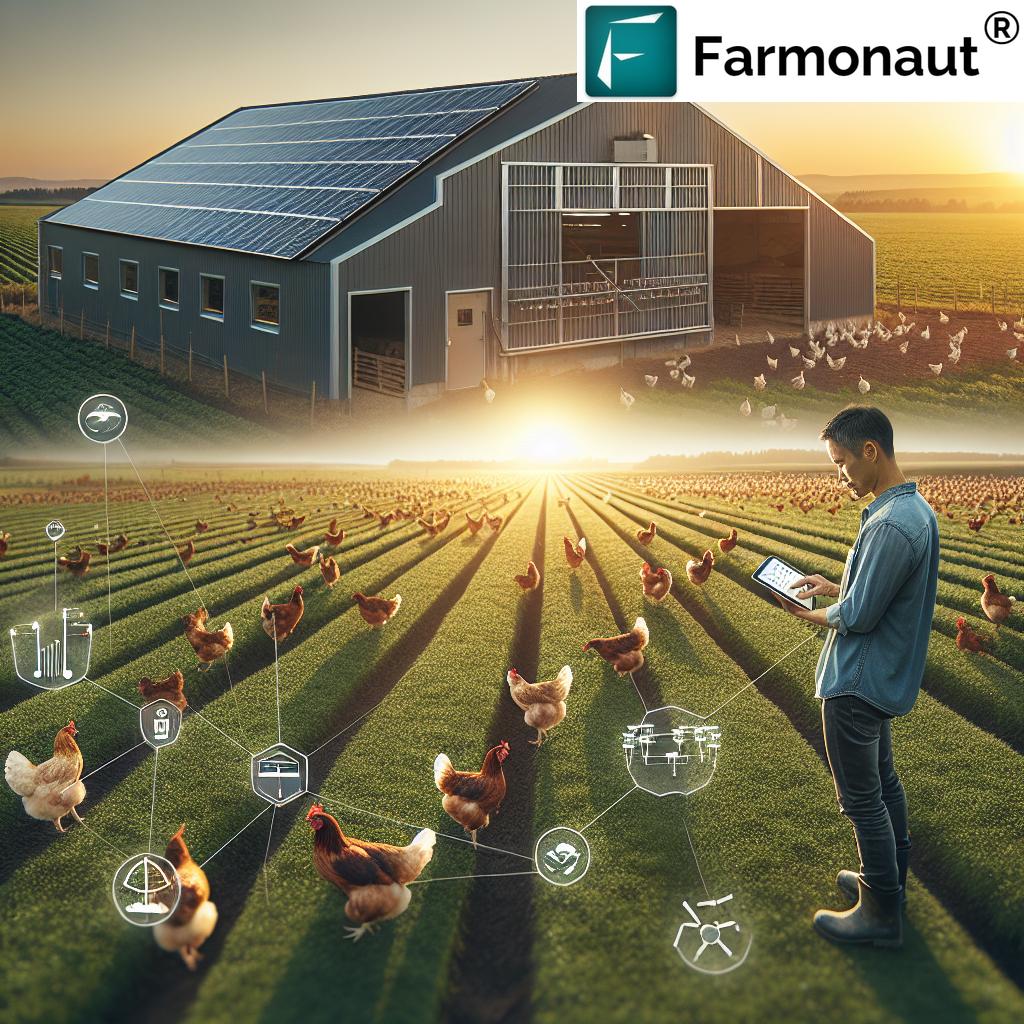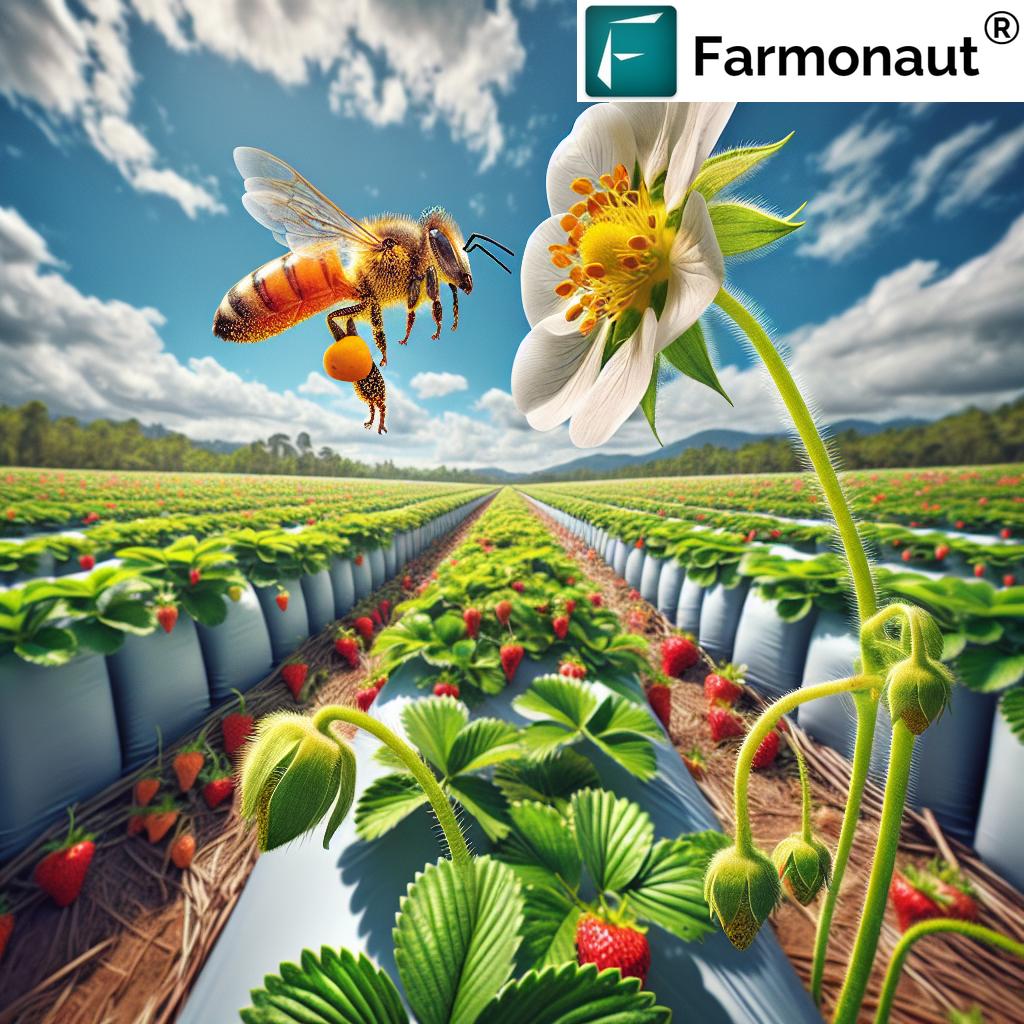Greenhouse Agriculture in British Columbia: 5 Powerful Trends for 2025
“British Columbia’s greenhouse vegetable production is projected to grow by 18% by 2025, driven by advanced cultivation technologies.”
Table of Contents
- Introduction
- Industry Context & Latest Transaction Developments
- Trends Comparison Table: Greenhouse Agriculture in British Columbia, 2025
- Trend 1: Advanced Automation in Greenhouse Agriculture
- Trend 2: Sustainable Energy Integration & Renewable Natural Gas
- Trend 3: Precision Environmental Control Powered by Technology
- Trend 4: Diversification into Cannabis Industry
- Trend 5: Export Market Expansion & Strategic M&A Roll-ups
- The Role of Farmonaut in Supporting Greenhouse Agriculture
- Conclusion: Greenhouse Agriculture Outlook in British Columbia
- Frequently Asked Questions (FAQ)
Introduction
As we move into 2025, greenhouse agriculture in British Columbia stands at an inflection point, reflecting global market forces, regulatory changes, and breakthrough advances in agritech. Our province, with its fertile lands and innovative producers, is rapidly becoming one of North America’s leading hubs for both fresh produce business and the evolving cannabis industry. The recent transaction involving Village Farms International and the formation of Vanguard Food LP signals not just a shift in business structure but also a larger transformation in controlled environment agriculture—one that impacts farmers, investors, and consumers alike on local and international scales.
In this comprehensive analysis, we explore five powerful trends set to shape greenhouse agriculture in British Columbia for 2025. From advanced automation and energy sustainability to export market growth, our approach weaves industry news with data-driven insights, technology integration, and practical applications informed by top agricultural experts.
We encourage all professionals in the sector, growers, agribusiness investors, food retailers, and policy-makers to leverage these insights for strategic planning and competitive advantage as British Columbia charts its next agricultural chapter.
“The global cannabis market is expected to reach $73.6 billion by 2027, with greenhouse agriculture fueling significant expansion.”
Industry Context & Latest Transaction Developments
Background: A New Era for British Columbia’s Greenhouse & Fresh Produce Business
The provincial market for greenhouse agriculture is led by organizations with decades-long expertise, such as Village Farms International. From producing staple vegetables to pioneering controlled environment agriculture for high-value crops like cannabis, these enterprises underpin both our regional food security and our role in the global cannabis industry.
The most recent and significant development, as outlined in the May 12, 2025 release, is the creation of Vanguard Food LP (“Vanguard”), a private investment in agriculture initiative formed through the privatization of select Village Farms assets. With Sweat Equities and several other private firms as backers, this joint venture seeks to roll up North America’s leading fresh produce business brands and assets—accelerating growth, expanding product lines, and sharpening the focus of Village Farms on international cannabis expansion.
- Transaction Overview: The agreement includes the transfer of Texas-based greenhouses (Marfa II, Fort Davis), IP, produce distribution facilities, and operational teams to Vanguard; in exchange, Village Farms receives a 37.9% equity stake and $40 million in cash, with future expansion potential and pre-emptive ownership rights.
- Strategic Impact: The reorganization enables Village Farms to prioritize its leadership in the cannabis industry (domestically and abroad), while Vanguard gains the financial might and commercial expertise needed to drive roll-ups and brand consolidation within fresh foods—often underpinned by sustainable agriculture and health-driven consumer trends.
- Operational Scope: Post-transaction, ongoing service and supply agreements ensure that British Columbia greenhouses—particularly the 60-acre Delta 1 facility—remain crucial to both organizations’ food production pipelines.
- Growth Strategy: Vanguard will execute M&A-driven expansion, aiming for a leading position in branded, consumer packaged goods (CPG) while leveraging Village Farms’ reputation for quality, sustainability, marketing, and distribution.
Against this evolving business landscape, several macro and micro-level trends are shaping the future of greenhouse agriculture in British Columbia—and by extension, the continent.
Trends Comparison Table: Greenhouse Agriculture in British Columbia, 2025
To contextualize these shifts, we compare the five principal greenhouse trends for 2025 within an easy-to-use reference format—enabling strategic reading and fast skimming for decision-makers in the agriculture, fresh foods, and cannabis sectors.
| Trend Name | Description | Estimated Market Impact (2025) | Projected CAGR (2023-2025, %) | Key Influencing Factor |
|---|---|---|---|---|
| Advanced Automation | Robotics, AI, and IoT-enabled precision systems for optimizing production, labor, and resource usage. | Boosts yield by 10-20%, reduces labor costs by up to 30% | 11% | Labor cost inflation; need for year-round supply |
| Sustainable Energy Integration | Adoption of renewables, notably renewable natural gas (RNG) and solar, to lower emissions and operational costs. | Saves 10-15% in energy costs; reduces CO2 emissions (~475,000 tons/year in Vancouver) | 13% | Government incentives; pressure for sustainability |
| Precision Environmental Control | AI, remote sensors, and satellite monitoring for real-time management of climate, irrigation, and crop health. | Improves quality consistency; reduces spoilage/waste by 12% | 14% | Tech investments; data-driven farm management |
| Diversification into Cannabis | Expansion of greenhouse space and CEA for both medical/recreational cannabis plus hemp and CBD products. | Enables entry into a market growing to $73.6B globally (by 2027) | 17% | Regulatory changes; rising global acceptance |
| Export Market Expansion (M&A Roll-ups) | Acquisitions, brand roll-ups, and broadening product categories to serve new international customers. | Boosts revenue diversification; protects against domestic volatility | 9% | Strategic capital investments; global M&A |
Trend 1: Advanced Automation in Greenhouse Agriculture
- Focus Keyword: Greenhouse Agriculture
Automation is rapidly reshaping the face of greenhouse agriculture in British Columbia. With rising operational costs, a tightening labor market, and pressure to deliver higher yield per square feet, our industry is embracing technology as a strategic imperative. The integration of robotics, Internet of Things (IoT) devices, and artificial intelligence allows for the fine-tuning of every aspect of production: seeding, climate control, nutrient application, and crop monitoring.
Key Components of Automation
- Robotic Harvesters: Automated machines carefully pick, sort, and package produce, improving efficiency and reducing crop damage.
- IoT-Enabled Sensors: Real-time data flows from environmental and crop sensors, providing insights into temperature, humidity, CO2, and growth rates.
- AI Optimization: Machine learning models identify patterns for optimal irrigation and nutrient cycles, reducing input waste and enhancing crop uniformity.
Strategic and Financial Impact
According to our trends comparison table, advanced automation is expected to boost yields by up to 20% while reducing labor expenditures by 30%. As capital becomes more available (aided by private investment in agriculture and strategic partnerships), automation technology finds new ground in both large-scale operational facilities and premium crop segments like greenhouse tomatoes, peppers, leafy greens, and even cannabis.
The strength of British Columbia’s established greenhouse assets—particularly those in Delta—makes it possible to pilot and scale these technologies regionally while remaining globally competitive. Enhanced mechanization also future-proofs businesses against labor shortages, rising wage pressure, and stricter regulatory requirements for workplace safety and food quality compliance.
Farmonaut’s Role in Automation:
At Farmonaut, we provide critical digital infrastructure for precision agriculture, including large-scale farm management tools that allow growers to monitor thousands of hectares remotely. Our satellite-based crop health monitoring, available through intuitive web and mobile interfaces, delivers actionable intelligence, enabling British Columbia’s producers to unlock automation’s full value by making data-driven operational decisions.
Savings & Risks
- Initial tech investment required can be offset by reduced year-over-year labor costs, increased productivity, and less spoilage.
- There are risks, like tech obsolescence, data security, and the need for skilled talent—but with scalable platforms like Farmonaut, these can be mitigated through robust support, ongoing advisory, and continuous digital upgrades.
Trend 2: Sustainable Energy Integration & Renewable Natural Gas
- Focus Keywords: Sustainable Energy Integration, Renewable Natural Gas
Responsible agriculture demands solutions that reduce environmental impact while controlling input costs. In British Columbia, sustainable energy practices within greenhouses—primarily the use of renewable natural gas (RNG)—are not only a regulatory and social mandate but a competitive necessity.
Organizations such as Village Farms, through partnerships, have shown that RNG sourced from landfill gas can cut CO₂ emissions by 475,000 metric tons per year in the Vancouver region—comparable to removing more than 100,000 vehicles from the road. The adoption of solar, biomass, and distributed energy storage further reduces the carbon footprint while stabilizing operational costs.
British Columbia’s regulatory environment, consumer demand for sustainability, and generous government incentives all create ideal conditions for innovation in this segment.
Economic Benefits & Expansion Potential
- Switching to renewables saves operators 10-15% on yearly utility bills.
- Facilities that integrate energy recovery and carbon recapture strategies future-proof themselves against rising gas and power prices.
- Energy-efficient greenhouse assets—like the Delta 1, 2, and 3 complexes—become even more attractive for future food and cannabis expansion projects.
Farmonaut and Sustainability:
Our carbon footprinting solution empowers growers to track, analyze, and report farm-level emissions in real time using satellite-derived data. This makes it easier to comply with environmental standards and demonstrate responsible production to both regulators and consumers in the food, cannabis, and hemp brands space.
Trend 3: Precision Environmental Control Powered by Technology
- Focus Keywords: Precision Environmental Control, Controlled Environment Agriculture
One of the greatest forces driving the greenhouse agriculture evolution is the shift towards precision environmental control—a subfield of controlled environment agriculture where climate, irrigation, lighting, and pest management are micromanaged with advanced sensors, remote monitoring, and artificial intelligence.
Delta-area greenhouses have long been pioneers in this discipline, and British Columbia is now using satellite, drone, and IoT technologies to maintain perfect growth conditions 24/7, 365 days a year. By harnessing granular data, producers can both optimize yields and minimize waste, all while adapting instantly to changing weather, pests, market demands, and even disease outbreaks.
Core Benefits for Stakeholders
- Higher output uniformity, leading to premium-quality product batches for commercial buyers and retailers.
- Reduced input use—fertilizers, water, pest controls—cutting operational costs and increasing supply reliability.
- Lower spoilage and improved disaster resilience as climate variables can be managed instantaneously from a mobile device or remote operating center.
Farmonaut: Leadership in Precision Environmental Control
Our satellite data API and Developer Documentation allow agritech developers and large-scale operations to integrate weather, soil, and crop health data directly into their production platforms. In conjunction with our AI-driven Jeevn advisory system, we ensure environmental parameters are optimized in real time.
Trend 4: Diversification into Cannabis Industry
- Focus Keywords: Cannabis Industry, Hemp and CBD Products, International Cannabis Expansion
The past five years have witnessed the rapid normalization and legal acceptance of both medical and recreational cannabis across Canada and internationally. British Columbia, armed with one of the world’s largest and most technologically advanced greenhouse operations (such as Pure Sunfarms’ 2.2 million square feet Delta facility), is uniquely positioned to lead in this high-growth market.
Our greenhouse agriculture landscape is now as much about cannabis and hemp as it is about traditional produce. Major operators plan further expansion—with up to 2.6 million square feet additional available for future international cannabis expansion.
Key Business Drivers
- Domestic Demand: Cannabis and CBD-infused consumer demand is growing across all demographics, encouraging brands to diversify their product suites.
- Export Opportunities: Canadian-grown and Delta-branded products are finding new markets, from Europe to Australasia, subject to unique regulatory constraints and opportunities.
- Vertical Integration: Players with combined expertise in cultivation, refinement, and branded CPG foods can realize greater margins and control over supply chains.
Farmonaut’s Precision Solutions for Cannabis & Hemp
Cannabis represents a unique challenge for precision agriculture. Quality, consistency, genetic tracking, and regulatory compliance require pinpoint data and traceability. Our blockchain-based product traceability tools ensure every cannabis and hemp product—from seedling to shelf—can be verified across the supply chain, meeting consumer and government trust requirements.
In addition, our crop loan and insurance solution makes it easier for cannabis and hemp producers to secure funding using reliable, satellite-verified documentation for risk assessment—reducing default rates and encouraging financial sector participation in this expansion opportunity.
Risks, Regulatory Landscape & Financial Implications
- Despite growth, the cannabis industry is still exposed to regulatory shifts, variable domestic/international pricing, and legal risks—so prudent investment and reliable data remain paramount.
- British Columbia’s leaders will need to remain agile, adapting to geopolitics, changing trade relationships, and evolving health regulations.
- Farmonaut offers compliance support through accurate, real-time reporting and evidence-based farm audits to reduce legal exposure.
Trend 5: Export Market Expansion & Strategic M&A Roll-ups
- Focus Keywords: Export Market Expansion, Joint Venture, M&A, Strategic Capital Partners
The future of fresh produce business and greenhouse agriculture in British Columbia will be increasingly shaped by global market integration. Recent business moves—such as the spin-off and roll-up strategy accelerating through Vanguard—highlight the critical role of joint ventures, mergers, and acquisitions in building resilient, diversified food and CPG giants for the next decade.
- By rolling up other North American brands and assets, new conglomerates are formed with the operational muscle and market reach capable of weathering regional shocks, labor variability, and consumer demand cycles.
- Such combined entities appeal to institutional capital and private investment firms, which are committed to driving scale—a must-have for taking share in competitive international markets.
Special Considerations for 2025 and Beyond
- British Columbia’s export capability, especially in premium products and value-added produce, stands to benefit from new access to Europe, Asia, and the United States—subject to regulatory harmonization.
- M&A roll-ups allow for rapid expansion in distribution facilities, advanced commercial marketing efforts, and back-end operational efficiencies.
- Service and supply agreements, such as those now in place between Village Farms and Vanguard for Delta facility output, are establishing the template for future partnerships in greenhouse agriculture.
Farmonaut: Traceability & Cross-Border Compliance
As more producers enter the export game, robust product traceability via blockchain becomes essential. This ensures compliance with differing global food safety regulations and facilitates customs processes, especially for high-value, perishable, or restricted products such as cannabis and hemp-derived goods.
Our fleet management platform also supports cross-border logistics, enabling managers to optimize vehicle allocation, reduce resource wastage, and provide verifiable documentation for international shipments.
“British Columbia’s greenhouse vegetable production is projected to grow by 18% by 2025, driven by advanced cultivation technologies.”
The Role of Farmonaut in Supporting Greenhouse Agriculture
- Focus Keywords: Precision Agriculture, Satellite-Based Farm Management, Blockchain Traceability, AI Advisory
Farmonaut’s Platform & Business Model
Farmonaut is committed to democratizing access to high-level agritech for all scales of greenhouse and field production. Our subscription-based model provides flexible entry points for individual farmers, large agribusinesses, cooperatives, and government institutions. Key platform benefits include:
- Satellite-Based Crop Health Monitoring: Multispectral imaging detects plant stress, pest outbreaks, and irrigation/fertilizer needs with pinpoint accuracy—reducing costs and boosting outputs.
- AI Advisory & Jeevn System: Personalized farm recommendations delivered in real time, tailored to British Columbia’s unique climate, crop cycles, and regulatory requirements.
- Blockchain Traceability: Secure product tracing for the cannabis, hemp, and fresh food markets.
- Fleet & Resource Management: Powerful operational tools to streamline logistics, optimize use of vehicles/machinery, and control input expenditures.
- Carbon Footprinting: Real-time emission tracking supports sustainability initiatives and compliance for eco-labeled exports.
- API Integration: API access and developer documentation offer seamless connectivity for custom agritech applications.
Use Cases and Target Audiences
- British Columbia greenhouse operators optimizing crop health remotely—whether within the agrifood or legal cannabis industry.
- Commercial facilities scaling production and minimizing disruptions via AI-driven advisory and IoT data synthesis.
- Exporters and large CPG companies integrating traceability and carbon reporting for international supply chain transparency.
- Financial institutions leveraging objective verification for crop loans and insurance.
Farmonaut Subscription Pricing Table
How to Get Started
- Download the Farmonaut App: Click here to start and gain instant access via web, Android, or iOS.
- For integration or custom solutions, visit our API page and see our full documentation.
Conclusion: Greenhouse Agriculture Outlook in British Columbia
Our province stands at the vanguard of greenhouse agriculture in North America and globally. The convergence of new transaction paradigms, strategic private investment, and cutting-edge technology presents enormous opportunities—alongside new risks—for all market participants.
We believe that the five powerful trends outlined above—automation, sustainability, precision control, diversification into cannabis, and export-driven roll-ups—will define the landscape through 2025 and beyond. Organizations equipped with flexible technology like Farmonaut, and guided by data-driven business practices, will lead the way in value creation, health-focused foods, and sustainable farming practices.
The time is now for growers, agribusinesses, exporters, and financial partners in British Columbia to invest in digital, scalable, and resilient systems—to unlock the full potential of our region’s agricultural assets for decades to come.
Frequently Asked Questions (FAQ)
-
What is greenhouse agriculture and why is it thriving in British Columbia?
Greenhouse agriculture involves cultivating crops under protected, controlled conditions to achieve higher yields, greater consistency, and off-season production. British Columbia’s favorable climate, strong logistics networks, experienced growers, and advanced facilities—such as those in Delta—have fueled its rapid rise.
-
How does Farmonaut support greenhouse operators?
Farmonaut provides a suite of tools including satellite crop health monitoring, AI farm advisory, fleet management, blockchain traceability, and carbon footprinting. These technologies help operators maximize yield, cut costs, prove sustainability, and comply with regulatory requirements.
-
What role does renewable natural gas play in greenhouse operations?
Renewable natural gas (RNG), generated from landfill or organic waste, is used to power and heat greenhouses, dramatically reducing carbon emissions and lowering energy expenditure—particularly in large-scale urban facilities such as those near Vancouver.
-
Why is environmental control so critical in modern greenhouses?
Precision environmental control ensures optimal growing conditions year-round, minimizing crop loss from external variables and enhancing both yield and quality through data-driven adjustments to climate, lighting, and irrigation.
-
What are the biggest risks for B.C. greenhouse agriculture in 2025?
Key risks include regulatory changes in both the produce and cannabis industry, labor market shifts, technology obsolescence, market volatility, and international trade disruptions. Investments in technology, compliance, and robust business models help mitigate these risks.
-
How can producers leverage Farmonaut’s API?
By accessing our Farmonaut API and developer docs, producers and agritech companies can integrate satellite and weather data directly into their existing systems for superior crop management.
-
What is the benefit of blockchain traceability for greenhouse produce and cannabis?
Our blockchain-based product traceability ensures every stage of the product journey—from seed or clone to consumer—is securely documented. This builds trust, improves food and cannabis safety, and simplifies regulatory compliance domestically and internationally.
-
What types of businesses can subscribe to Farmonaut’s services?
Farmonaut serves everyone from smallholder farmers and medium-sized greenhouse operators to large-scale agribusinesses, government agencies, and financial institutions. Our large-scale farm management solution supports multi-site, multi-region operations.
-
How is the expansion into cannabis affecting the traditional fresh produce business?
Diversification into cannabis and hemp and CBD products allows greenhouses to access high-margin markets, stabilize revenue against produce market swings, and drive year-round utilization of facilities, though it may require modifications to production lines and compliance processes.
-
Are Farmonaut’s technologies suitable for both produce and cannabis?
Yes, our platform is crop-agnostic and can be customized for any type of controlled environment agriculture, including high-value produce, cannabis, and hemp—with solutions that address the traceability, sustainability, advisory, and operational needs unique to each segment.




